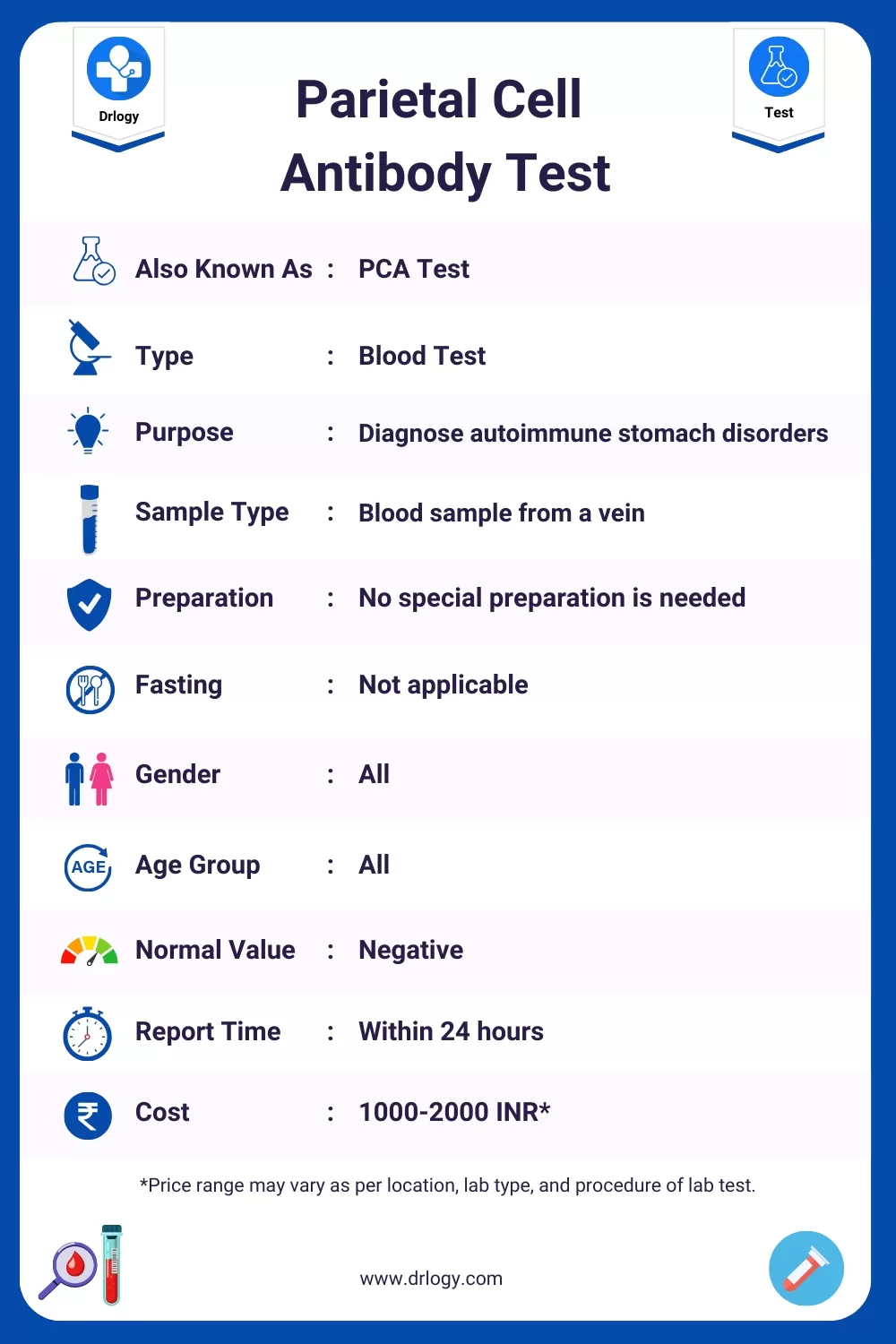
The Parietal Cell Antibody Test identifies specific antibodies in the blood linked to autoimmune conditions affecting the stomach, such as pernicious anemia and chronic gastritis. It aids in the diagnosis and management of these disorders.
Here are the basic details of the Parietal Cell Antibody Test.
| Also Known As | PCA Test, Anti Parietal Cell Antibody test, APCA test |
| Type | Blood Test |
| Purpose | To diagnose and manage autoimmune stomach disorders |
| Sample Type | Blood sample from a vein |
| Preparation | Typically, no special preparation is needed |
| Fasting | Not applicable |
| Gender | All |
| Age Group | All |
| Normal Value | Negative |
| Reporting Time | Within 24 hours |
| Cost | 1000-2000 INR* |
*Parietal Cell Antibody Test Price range may vary as per location, lab type, and procedure of lab test.
Parietal Cell Antibody Test detects specific autoantibodies associated with autoimmune stomach conditions, such as pernicious anemia.
The purpose of the Parietal Cell Antibody Test is to:

Here is the basic preparation for the Parietal Cell Antibody Test.
Here is the basic Parietal Cell Antibody Test Procedure.
Here's how to interpret the results of a PCA test.
Positive Result:
Negative Result:
Here is the normal range of the Parietal Cell Antibody Test
| Normal Range | Parietal Cell Antibody Level (units) |
|---|---|
| Negative | 0.0-20.0 units |
Here is the Interpretation of the Parietal Cell Antibody Test.
| Antibody Test Result | Interpretation |
|---|---|
| Negative | No detectable IgG antibodies (0.0-20.0 units). |
| Positive | IgG antibodies present (≥25.0 units). |
| Equivocal | Antibody levels between 20.1-24.9 units. |
| Optimal Range | Desired range for normal results: 0-20 units. |
Here are potential causes associated with positive Parietal Cell Antibody test results:
| Potential Causes | Description |
|---|---|
| Pernicious Anemia | Strongly suggests pernicious anemia. |
| Autoimmune Gastritis | May indicate autoimmune gastritis. |
| Autoimmune Conditions | Can be linked to other autoimmune diseases. |
A positive Parietal Cell Antibody test result often suggests pernicious anemia, but it can also be associated with related autoimmune conditions. Further evaluation and clinical context are essential for a definitive diagnosis.
Here's the meaning of negative results in the Parietal Cell Antibody test.
| Antibody Test Result | Interpretation |
|---|---|
| Negative | No detectable IgG antibodies to H(+)/K(+) ATPase (0.0-20.0 units). |
| Pernicious Anemia | A negative result does not rule out pernicious anemia, as it can still be present despite a negative test. |
| Further Assessment | Other diagnostic tests or clinical evaluation may be required to confirm or rule out pernicious anemia. |
A negative Parietal Cell Antibody test result suggests no detectable IgG antibodies to H(+)/K(+) ATPase but does not conclusively rule out pernicious anemia. Additional assessments are often needed for a comprehensive diagnosis.
Here are the specimen requirements for the Parietal Cell Antibody Test.
|
Specimen |
Serum |
|
|
Volume |
1 ml |
|
|
Container |
Red-top tube or gel-barrier tube |
|
|
Collection |
Separate serum from cells within one hour of collection. Transfer to a plastic transport tube before shipping. |
|
|
Storage |
Refrigerate or freeze. |
|
|
Sample Stability |
Temperature |
Period |
|
Room temperature |
14 days |
|
|
Refrigerated |
14 days |
|
|
Frozen |
14 days |
|
|
Freeze/thaw cycles |
Stable x3 |
|
|
Causes for Rejection |
Hemolysis; lipemia; gross bacterial contamination; heat-treated specimen; specimen with preservative added. |
|
The Parietal Cell Antibody test is generally considered safe.
Here is the basic limitation of Parietal Cell Antibody Test.
Here are some of the risk factors of the Parietal Cell Antibody Test.
Here are the Doctor's recommendations or consult a specialist after the Parietal Cell Antibody Test.
| Test Result | Doctor to Visit | Reason to Go |
|---|---|---|
| Positive | Gastroenterologist or Hematologist | Assess autoimmune conditions or anemia. |
| Negative | Primary Care Physician | Further investigation if needed. |
Here are the estimated Parietal Cell Antibody Test Prices in India with different top cities:
|
City |
Price Range (INR)* |
|
1000-2000 |
|
|
1200-2000 |
|
|
1000-2000 |
|
|
1200-2000 |
|
|
1000-2000 |
|
|
1200-2000 |
|
|
1000-2000 |
|
|
1200-2000 |
|
|
1200-2000 |
|
|
1000-2000 |
|
|
1200-2000 |
|
|
1000-2000 |
|
|
1200-2000 |
|
|
1000-2000 |
*Parietal Cell Antibody Test Price are approximate and vary depending on a specific laboratory or healthcare facility.
Summary
Overall, Parietal Cell Antibody Test plays a crucial role in diagnosing autoimmune gastritis and pernicious anemia, enabling early intervention and appropriate treatment. Also check Drlogy Test for detailed information about all medical tests for patients, doctors, scholers and medical students.
Reference
DOCTOR'S MOST TRUSTED HEALTHCARE PLATFORM
10M+Patients
30000+Doctors
25000+Hospitals/Labs